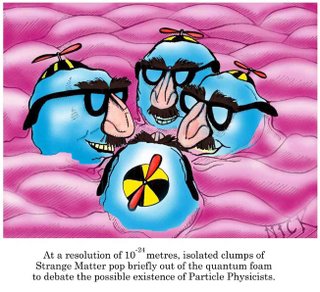 As if to demonstrate that we know far less about astro- and quantum physics than we think we do, New Scientist reports this week that the existence of black holes is under question by a Noble physicist and his colleague.
As if to demonstrate that we know far less about astro- and quantum physics than we think we do, New Scientist reports this week that the existence of black holes is under question by a Noble physicist and his colleague.Dark energy and dark matter, two of the greatest mysteries confronting physicists, may be two sides of the same coin. A new and as yet undiscovered kind of star could explain both phenomena and, in turn, remove black holes from the lexicon of cosmology...Quantum physics? Contradictions? I'm sure when historians do look back they'll be questioning them all, as scientists and philsophers should be doing now. Most 'contradictions' associated with QM seem to involve drawing too-extensive conclusions from too few observations, or forming conclusions that undercut the very scientific methodology and philosophical bases being used to make the observations.
"People have been vaguely uncomfortable about ... problems [associated with the theory of black holes] for a while, but they figured they'd get solved someday," says [physicist George] Chapline. "But that hasn't happened and I'm sure when historians look back, they'll wonder why people didn't question these contradictions."
I look forward to discussing this further tomorrow over a beer. And I also look forward to SF authors finding some new plot lines for their stories.
LINKS: Three cosmic enigmas, one audacious answer - New Scientist
Three cosmic enigmas, one answer - Press Release
Rugby, Physics, Philosophy & Beer - update - Not PC
Cartoons by Nick Kim
TAGS: Science, Philosophy
3 comments:
Actually, this debate has been going on for a very long time. 'New Scientist' is a terrible source of news for new and novel controversies in the Sciences as it is usually horribly out of date and has suspect (read: biased) reporting mechanisms.
I'm so glad that evolutionism and old earth theory has no black holes in it. At least these theories are safe from questioning by unbelievers.
"involve drawing too-extensive conclusions from too few observations,"
Otherwise known as trying to make too much stew from one onion. A quaint expression that I learned from you. Please tell me that you didn't come up with it while editing my PhD thesis for grammar... :-)
Post a Comment